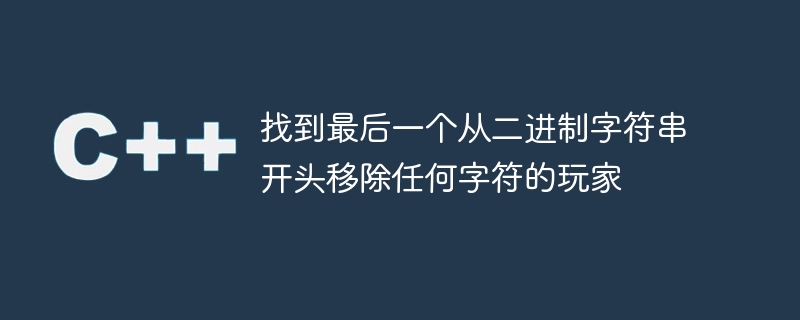

When dealing with binary strings in C, you often need to identify specific patterns or players that perform certain actions. A common task is to find the last player to remove any characters from the beginning of a binary string. In this article, we discuss an algorithm to solve this problem and provide a C example implementation.
Given a binary string s and two players A and B, the players take turns removing any characters at the beginning of the string. The player who removes the last character wins. If both players play their best, it is determined which player will win the game.
To solve this problem, we can use a simple observation. The player who starts the game with an odd number of 1's will always win, and the player who starts the game with an even number of 1's will always lose.
We can count the number of 1's in the binary string s and determine which player starts the game. If the number of 1's is an odd number, player A starts the game and wins. If the number of 1's is even, player B starts the game and loses.
This is an implementation of the algorithm in C -
#include <iostream>
#include <string>
using namespace std;
string findLastPlayer(string s) {
int countOnes = 0;
for (int i = 0; i < s.length(); i++) {
if (s[i] == '1') {
countOnes++;
}
}
if (countOnes % 2 == 1) {
return "Player A";
} else {
return "Player B";
}
}
int main() {
string s = "1101001";
string lastPlayer = findLastPlayer(s);
cout << "The last player to remove a character is " << lastPlayer << "." << endl;
return 0;
}
The last player to remove a character is Player B.
In this implementation, we use a loop to count the number of 1's in the binary string s. We initialize the counter countOnes to 0 and increment it for each character equal to "1". We then check if countOnes is odd or even and return the winning player's name.
Let's test this function with an example. Suppose we have the following binary string -
string s = "101010";
We can call the findLastPlayer() function using s as a parameter:
string lastPlayer = findLastPlayer(s);
This function will return "Player B" because the number of 1's in string s is an even number and Player B started the game and will lose. If we have an odd number of 1's in a binary string, the function will return "Player A" because Player A will start the game and win.
In summary, we propose an algorithm to solve the problem of finding the player who last deleted any character from the beginning of a binary string in C. By counting the number of 1's in the string, we can determine which player started the game and who will win. We also provide a C example implementation of the algorithm along with a test case to demonstrate its usage. By following the steps outlined in this article, you should now be able to determine the last player to remove characters from a binary string in your C program.
The above is the detailed content of Find the last player to remove any characters from the beginning of a binary string. For more information, please follow other related articles on the PHP Chinese website!
 The difference between console cable and network cable
The difference between console cable and network cable
 How to resume use of gas after payment
How to resume use of gas after payment
 fil coin price today
fil coin price today
 How to solve website restore error
How to solve website restore error
 css background code collection
css background code collection
 What is the reason why the computer screen is black but the computer is on?
What is the reason why the computer screen is black but the computer is on?
 What is the transfer limit of Alipay?
What is the transfer limit of Alipay?
 Absolute reference input method
Absolute reference input method




